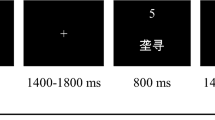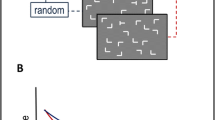Abstract
From intense interest in implicit memory there have evolved various methods for separating the respective influence of implicit (unconscious) and explicit (conscious) processes on performance of various tasks. Two experiments are reported, utilizing a levels-of-processing (LOP) approach to manipulate encoding level and comparable indirect (word-stem completion) and direct (cued-completion) retention tests. Confidence ratings of recollection were taken for each direct test response. The aim of these experiments was to explore the role that guessing plays in direct-test performance (Experiments 1 and 2) and to contrast this with performance in a comparable indirect test (Experiment 2). Analysis of correctly guessed responses showed that direct-test performance was reliably influenced by unconscious processes, but differently as a function of LOP. Guessing stems of nonsemantically processed words was found to enhance performance, whereas guessing stems of semantically processed words had no effect on performance. Results are discussed in terms of the similarity between guessing in a direct test and engaging in an indirect test, and subjects' unwitting resourcefulness at being able to retrieve words they cannot explicitly remember.
Similar content being viewed by others
References
Bowers, J. S., & Schacter, D. L. (1990). Implicit memory and test awareness.Journal of Experimental Psychology: Learning, Memory, and Cognition, 16, 404–416.
Challis, B. H., & Brodbeck, D. R. (1992). Level of processing affects priming in word fragment completion. Journal of Experimental Psychology: Learning, Memory, and Cognition,18, 595–607.
Coltheart, M. (1981). The MRC Psycholinguistic Database.Quarterly Journal of Experimental Psychology, 33A, 497–505.
Craik, F. I. M., & Lockhart, R. S. (1972). Levels of processing: A framework for memory research.Journal of Verbal Learning and Verbal Behavior, 11, 671–684.
Craik, F. I. M., & Tulving, E. (1975). Depth of processing and the retention of words in episodic memory.Journal of Experimental Psychology: General, 104, 268–294.
Dixon, N. F. (1971). Subliminal perception: The nature of a controversy. London: McGraw-Hill.
Gabrieli, J. D. E., Milberg, W., Keane, M. W., & Corkin, S. (1990). Intact priming of patterns despite impaired memory.Neuropsychologia, 28, 417–428.
Gardiner, J. M. (1988). Functional aspects of recollectioe experience.Memory & Cognition, 16, 309–313.
Graf, P., & Mandler, G. (1984). Activation makes words more accessible, but not necessarily more retrievable.Journal of Verbal Learning and Verbal Behavior, 23, 553–568.
Graf, P., Mandler, G., & Haden, P. E. (1982). Simulating amnesic symptoms in normal subjects. Science, 218, 1243–1244.
Graf, P., & Schacter, D. L. (1985). Implicit and explicit memory for new associations in normal and amnesic patients.Journal of Experimental Psychology: Learning, Memory, and Cognition, 11, 501–518.
Graf, P., Squire, L. R., & Mandler, G. (1984). The information that amnesic patients do not forget.Journal of Experimental Psychology: Learning, Memory, and Cognition, 10, 164–178.
Greenwald, A. G. (1992). New Look 3: Unconscious cognition reclaimed.American Psychologist, 47, 766–779.
Hashtroudi, S., Ferguson, S. A., Rappold, V. A., & Chrosniak, L. D. (1988). Data-driven and conceptually driven processes in partialword identification and recognition.Journal of Experimental Psychology: Learning, Memory, and Cognition, 14, 749–757.
Holender, D. (1986). Semantic activation without conscious identification in dichotic listening, parafoveal vision, and visual masking: A survey and appraisal.Behavioural and Brain Sciences, 9, 1–66.
Jocoby, L. L. (1991). A process dissociation framework: Separating automatic from intentional uses of memory.Journal of Memory and Language, 30, 513–541.
Jacoby, L. L., & Dallas, M. (1981). On the relationship between autobiographical memory and perceptual learning.Journal of Experimental Psychology: General, 110, 306–340.
Jocoby, L. L., Lindsay, D. S.; & Toth, J. P. (1992). Unconscious influences revealed: Attention, awareness, and control.American Psychologist, 47, 802–809.
Jocoby, L. L., Toth, J. P., & Yonelinas, A. P. (1993). Separating conscious and unconscious influences of memory: Measuring recollection.Journal of Experimental Psychology: General, 122, 139–154.
Joordens, S., & Merikle, P. M. (1993). Independence or redundancy? Two models of conscious and unconscious influences.Journal of Experimental Psychology: General, 122, 462–467.
Kihlstrom, J. F. (1987). The cognitive unconscious.Science, 237, 1445–1452.
Kucera, M., & Francis, W. (1967). Computational analysis of present-day American English. Providence, RI: Brown University Press.
Lhermitte, F., & Serdaru, M. (1993). Unconscious processing in memory recall: A study of three amnesic patients.Cortex, 29, 25–43.
Light, L. L., & Singh, A. (1987). Implicit and explicit memory in young and older adults.Journal of Experimental Psychology: Learning, Memory, and Cognition, 13, 531–541.
Merikle, P. M. (1992). Perception without awareness: Critical issues.American Psychologist, 47, 792–795.
Merikle, P. M., & Reingold, E. M. (1991). Comparing direct (explicit) and indirect (implicit) measures to study unconscious memory.Journal of Experimental Psychology: Learning, Memory, and Cognition, 17, 224–233.
Nelson, D. L., Schreiber, T. A., & McEvoy, C. L. (1992). Processing implicit and explicit representations.Psychological Review, 99, 322–348.
Ornstein, R. E. (1991). The evolution of consciousness: Of Darwin, Freud, and cranial fire: The origins of the way we think. New York: Prentice Hall Press.
Reber, A. S. (1990). The primacy of the implicit: A comment on Perruchet and Pacteau.Journal of Experimental Psychology: General, 119, 340–342.
Reber, A. S. (1993).Implicit learning and tacit knowledge: An essay on the cognitive unconscious. New York: Oxford University Press.
Richardson-Klavehn, A., & Bjork, R. A. (1988). Measures of memory.Annual Review of Psychology, 39, 475–543.
Roediger, H. L. (1990). Implicit memory: Retention without remembering.American Psychologist, 45, 1043–1056.
Roediger, H. L., & McDermott, K. B. (1993). Implicit memory in normal human subjects. In F. Boller and J. Grafman (Eds.),Handbook of neuropsychology, Vol. 8 (pp. 63–131). Amsterdam: Elsevier Science Publications.
Roediger, H. L., Weldon, M. S., Stadler, M. L., & Riegler, G. L. (1992). Direct comparison of two implicit memory tests: Word fragment and word stem completion.Journal of Experimental Psychology: Learning, Memory, and Cognition, 18, 1251–1269.
Schacter, D. L. (1987). Implict memory: History and current status.Journal of Experimental Psychology: Learning, Memory, and Cognition, 13, 501–518.
Schacter, D. L., Bowers, J., & Booker, J. (1989). Intention, awareness, and implicit memory: The retrieval intentionality criterion. In S. Lewandowsky, J. C. Dunn, & K. Kirsner (Eds.), Implicit memory: Theoretical issues (pp. 47–65). Hillsdale, NJ: Erlbaum.
Schacter, D. L., Chin, C.-Y. P., & Ochsner, K. N. (1993). Implicit Memory: A selective review.Annual Review of Neuroscience, 16, 159–182.
Schacter, D. L., & McGlynn, S. (1989). Implicit memory: Effects of elaboration depend on unitization.American Journal of Psychology, 102, 151–181.
Shimamura, A. P. (1986). Priming effects in amnesia: Evidence for a dissociable memory function.Quarterly Journal of Experimental Psychology, 38A, 619–644.
Sidis, B. (1898).The psychology of suggestion. New York: Appleton.
Weldon, M. S. (1991). Mechanisms underlying priming on perceptual tests.Journal of Experimental Psychology: Learning, Memory, and Cognition, 17, 526–541.
Weldon, M. S., Roediger, H. L., & Challis, B. F. (1989). The properties of retrieval cues constrain the picture superiority effect.Memory & Cognition, 17, 95–105.
Author information
Authors and Affiliations
Corresponding author
Rights and permissions
About this article
Cite this article
Langsford, P.B., Mackenzie, B.D. Unconscious influences on direct-test performance. Psychol. Res 58, 134–143 (1995). https://doi.org/10.1007/BF00571101
Received:
Accepted:
Issue Date:
DOI: https://doi.org/10.1007/BF00571101




